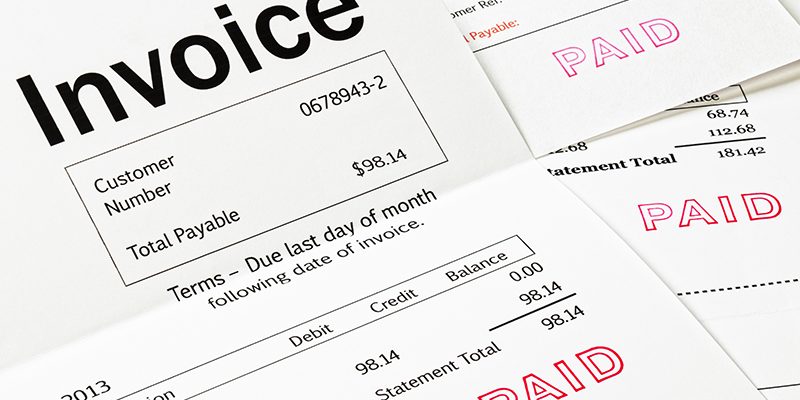Invoicing: 10 Key pieces of Information you need to have to get paid faster
Invoicing is a key business process and the better your process, the more chance there is of your debtors paying on time. It is a costly time resource to chase for payment of invoices so getting your invoice right is an important aspect of the whole credit control process. With plenty of software programs and apps that help SMEs manage the process effectively and efficiently, there shouldn’t really be any excuses as to why you don’t have a thorough invoicing process in place for your business.
Nowadays, a large majority of small businesses utilise accounting or bookkeeping software to produce and automate invoicing, however automation alone doesn’t guarantee you are paid on time. Before we outline the 10 essential pieces of information you should have on your invoices, it’s important to note that it is imperative that you review who’s receiving your invoices and make sure that the key stakeholders are receiving them to avoid any unnecessary delays.
In order to help make sure you get paid faster, we have outlined the key pieces of information an invoice should contain (at a bare minimum) as well as some best practice guidelines.
1. Company logo
Although not essential, your company logo provides an invoice with your identity.
2. Contact Details
Your business contact details – mailing address, email address, and contact telephone numbers should be clear on your invoice. The preferable placement is directly by your logo at the top of the invoice and also at the footer of the invoice. If you are a registered for GST, include your ACN and or ABN.
3. Invoice
Your document should be clearly titled with the word ‘invoice’ to distinguish it from other accounting documents that the accounts department may receive such as credit notes and statements of account. It should also contain an invoice number, date, job or project description, and in some instances, purchase order numbers. This will facilitate easy reconciliation on both sides and limit any potential issues.
4. Client Information
All information relating to the client should be accurate. Your contact may be different to the person handling your account so include your contact name as well as the name of the account handler (if you are able to obtain it). It is always best to check how your client wants their invoices addressed and to where they should be sent. The trading name might be different to the legal name and accounts may be managed in a completely different location or country, so addressing your invoice correctly can avoid payment delays.
5. Payment Terms
The expected payment date as per your trading terms should be clearly visible. Avoid ambiguous terms such as “payment is due within 10 days of receipt” as this can be open to abuse with a claim the invoice hadn’t been receipted.
6. Early Settlement Discounts
If you offer early payment discounts, highlight this close to the payment terms. It should include a specific date by when the invoice must be paid in order for the discount to be issued.
7. Details of Service or Goods Provided
Include an itemised breakdown of the items for which you are requesting payment. If the client uses a specific identification system, such as part, catalogue, purchase or order numbers, make sure you include them in your invoice. Breakdown the goods/service into their tax and non-tax values, providing subtotals for each to avoid confusion.
8. Amount Due
This should be the most noticeable item on your invoice. It should be in bold to make it stand out from any other information on the document.
9. Payment Methods
Each invoice should include your accepted payment methods. Offering several ways to be paid can increase your chances of faster settlement, so include your bank details and any other methods your business accepts as payment.
10. Terms and Conditions
It’s important to state your specific terms and conditions so that each customer knows their contractual obligations. By adding these to your invoice will simply help reinforce your terms and reduce slow paying customers.
About Marshall Freeman
Marshall Freeman is Australia’s leading debt collection and recovery specialists. Through servicing over 20,000 businesses throughout Australia for over 15 years, we have gained a reputation as an industry leader in providing financial information, knowledge and education for small and medium sized enterprises.

